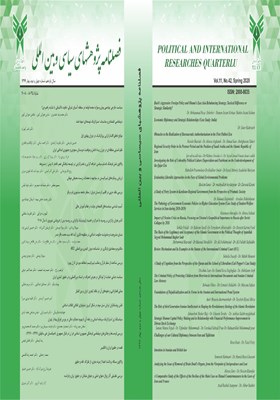واکاوی نقش فرهنگ ناسالم سیاسی (خرافه گرایی و تقدیرگرایی) بر توسعه نیافتگی عصر قاجار تا پیش از مشروطه
محورهای موضوعی : مجله پژوهش های سیاسی و بین المللیروح الله پورملایی 1 , علی اکبر امینی 2 * , سید اسد الله اطهری مریان 3
1 -
2 -
3 -
کلید واژه: توسعه نیافتگی, خرافات, پاتریمونیالیسم, فرهنگ سیاسی ناسالم,
چکیده مقاله :
روح الله پورملایی[1]- علی اکبر امینی[2]- سید اسد الله اطهری مریان[3] تاریخ دریافت: 7/9/1398- تاریخ پذیرش: 24/9/1398 چکیده: فرهنگ سیاسی به مجموعه ای از باورها، ارزشها و هنجارهای موجود درباره قدرت و سیاست می گویند تحت تاثیر عواملی همچون وضعیت جغرافیایی و اقلیمی، ساختارهای سیاسی و اجتماعی، شرایط تاریخی، آداب و رسوم و همچنین نظام اقتصادی شکل می گیرد و سپس در یک فرآیند مستمر جامعه پذیری نهادینه می شود و از نسلی به نسل دیگر منتقل می شود. در عصر قاجار فرهنگ سیاسی در ساحت ناسالم آن همچون فرهنگ پاتریمونیالیستی، اعتقاد به باورهای خرافی، تقدیر گرایی و.. تفکر غالب در جامعه بود، به طوری که رد پای آن در سفرنامه ها، آثار ادیبان و متفکران این دوره به وفور یافت می شود. پژوهش حاضر با روش توصیفی- تحلیلی و با استفاده از چارچوب نظری تحلیل گفتمان انتقادی نورمن فرکلاف در پی پاسخ به این پرسش است که فرهنگ سیاسی ناسالم (خرافه گرا و تقدیرگرا) چه نقشی بر توسعه نیافتگی دوره قاجار ایفا کرده است؟ طبق بررسی های صورت گرفته با استفاده از ابزار کتابخانه ای- اسنادی این نتیجه حاصل شد که عقل ستیزی، خرد گریزی و بی خبری، و در کنار آن فرهنگ پاتریمونیالیستی و ساختار استبدادی، در این دوره چالش های متعدد اقتصادی، سیاسی و اجتماعی را به وجود آورد که سبب گرایش به فرهنگ ناسالم سیاسی همچون خرافه گرایی و تقدیر گرایی شد، و این امر منجر به بازتولید استبداد، باز تولید جهل، بازتولید بی خبری شد و در نهایت توسعه نیافتگی و عقب ماندگی را در این دوران رقم زد. [1] - دانشجوی دکتری، علوم سیاسی (مسائل ایران)، واحد زاهدان، دانشگاه آزاد اسلامی، زاهدان، ایران r.pourmolaee@gmail.com [2] - استادیار و عضو هیئت علمی، گروه علوم سیاسی، واحد تهران مرکزی، دانشگاه آزاد اسلامی، تهران، ایران: نویسنده مسئول aliakbaramini@ymail.com [3] - استادیار و عضو هیئت علمی، گروه علوم سیاسی، واحد تاکستان، دانشگاه آزاد اسلامی، قزوین، ایران athariy.asadolah@yhoo.com
Ruhollah Pourmolaee [1] Amini Aliakbar [2] Asadolah Athariy Mariyan[3] Abstract: Political culture is a set of beliefs, values, and norms about power and politics that are shaped by factors such as geographic and climatic conditions, political and social structures, historical conditions, customs, and the economic system, and then form a process. Constant socialization is institutionalized and passed down from generation to generation. In the Qajar era, political culture in its unhealthy area, such as Patrimonialist culture, believed in superstitious beliefs, fatalism, and prevailing thinking in society, so that its footprint is abundantly found in travelogues, literary works, and intellectuals of this period. The present study, using a descriptive-analytical approach and using the theoretical framework of Norman Fairclough’s critical discourse analysis, seeks to answer the question of what role did unhealthy (superstitious and fatalistic) political culture play in the underdevelopment of the Qajar era? According to studies using library-documentary tools, it was concluded that irrationality, irrationality and ignorance, along with patrimonial culture and authoritarian structure, in this period challenged various economic, political and social challenges. It led to a tendency towards unhealthy political culture such as superstition and destiny, and this led to the reproduction of tyranny, the reproduction of ignorance, the reproduction of ignorance, and ultimately the underdevelopment and backwardness of this period. [1]- PhD Student, Political Science (Iran Issues), Zahedan Branch, Islamic Azad University, Zahedan, Iran [2] - Assistant Professor and Faculty Member, Department of Political Science, Central Tehran Branch, Islamic Azad University, Tehran, Iran:Corresponding Author [3] - Assistant Professor and Faculty Member, Department of Political Science, Takestan Branch, Islamic Azad University, Qazvin, Iran
_||_

